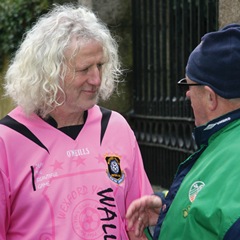The independents
 As the largest number of independents ever elected to Dáil Éireann find their feet and work out the practicalities of operating a technical group, Meadhbh Monahan looks at the make-up of the grouping.
As the largest number of independents ever elected to Dáil Éireann find their feet and work out the practicalities of operating a technical group, Meadhbh Monahan looks at the make-up of the grouping.
Seated in the top left-hand corner as one enters the Dáil, a cluster of independent TDs have helped change the face of the chamber with their colourful clothes and hair, and their varying political philosophies.
Fourteen independents were elected to the 31st Dáil. In addition, the United Left Alliance (ULA) – an amalgamation of the Socialist Party, People Before Profit, and the Workers and Unemployed Action Group – gained five seats. A 16-member technical group has been formed, comprising 11 independents and the five ULA members. Three independents (Noel Grealish, Michael Healy-Rae and Michael Lowry) did not join the technical group.
At the time of writing, all of the technical group’s TDs had spoken and eight of them had spoken twice in the new Dáil. Burning the bond holders, domestic turf cutting rights and a referendum on the IMF-EU deal were among the issues raised by the technical group.
Elected as an alternative to Fianna Fáil, which had been in power for 61 of the last 79 years, the first-time TDs admit they are still finding their feet.
“I have a lot to learn but I’m up for the challenge,” Luke ‘Ming’ Flanagan, independent TD for Roscommon South- Leitrim, tells eolas.
The technical group’s three speakers are: former Socialist MEP, Joe Higgins; Finian McGrath, who withdrew his support from the last Government over health cuts; and Shane Ross, a columnist and former independent Senator.
Situated in Agriculture House on Kildare Street, the technical group will “be physically close”. The group’s whip is Catherine Murphy (Kildare North). She explains that the members are currently bedding down in their new offices.
The group’s priority is to get their individual messages across in a fair and effective manner, Murphy tells eolas.
“We have had a few meetings and people are willing to help each other out, there’s a generosity and that’s a very good basis to start work.”
Murphy, who previously represented Kildare North from 2002 to 2007, shared a 15-minute slot on 15 March with Richard Boyd Barrett and John Halligan, and managed to mention literacy, special education and tax exiles. “It’s always an honour and a privilege to address the Dáil,” she claims. However, she acknowledges that “there’s a lot of behind the scenes work going on, for example, on the logistics of finding out who wants to speak and devising a fair system.” Murphy is also working on “ensuring that we rotate priority questions fairly.”
Murphy adds: “Every independent is different. Basically, our intention is to make sure all factors will find a way of getting their message across equally.”
Ultimately, Murphy is “optimistic that [the technical group is] going to function well.”
Finian McGrath (Dublin North Central) agrees. “There is a major change around the Dáil with 19 Independent TDs elected and 16 in our group which means more speaking time, leaders’ questions, priority questions and more opportunities,” he says.
“There are a lot of practicalities to be ironed out yet.” These include a rota for speakers and organising more meetings.
“Catherine Murphy and Maureen O’Sullivan are doing major work on this. We should be bedded down in a week or two,” he believes. “There is a lot of positive energy in our group and respect for difference.”
Flanagan tells eolas that his first week as a TD has been “educational and interesting.” He found it “astonishing” that “at a time when there is more money needed in the health system that there are two people employed to push in the Ceann Comhairle’s chair.”
He explains: “Every time you turn around there is someone offering to refill your glass of water or take your coat.”
Flanagan concedes that “they are very good workers,” but believes “they would be better deployed in a hospital rather than pampering [TDs] who are too used to being pampered.”
Wexford independent TD Mick Wallace was also initially put off by the traditions of Leinster House. He wrote in The Irish Times: “My first impression was that the place was very formal … I don’t do formal very well, and, in fairness to the staff, who could not be more pleasant, many of them have become more casual too as they’ve noticed that I’m a bit allergic to pomp and ceremony.”
Describing how he felt when addressing the Dáil for the first time, Flanagan tells eolas: “I got up on the first day in the Dáil after spending 14 years trying to get in and I thought: ‘Oh my God, what am I doing?’ But once I started talking I thought: ‘Who am I speaking to but ordinary men and women, the same as I have my whole life, and some of them, not half as impressive as [others] I have met.’”
So far, he believes that the allocation of speaking slots “is going well.” However, he is looking at the possibility of building up his speaking time and using it once every two weeks “rather than getting three minutes here and there.”
At the time of interview he was the only TD from his constituency to have spoken in the Dáil despite the fact the other two (Frank Feighan and Denis Naughten) are in Fine Gael.
In his opening comments on 9 March, he told the chamber: “If I don’t get my spake in here, I’ll do it through the media.”





